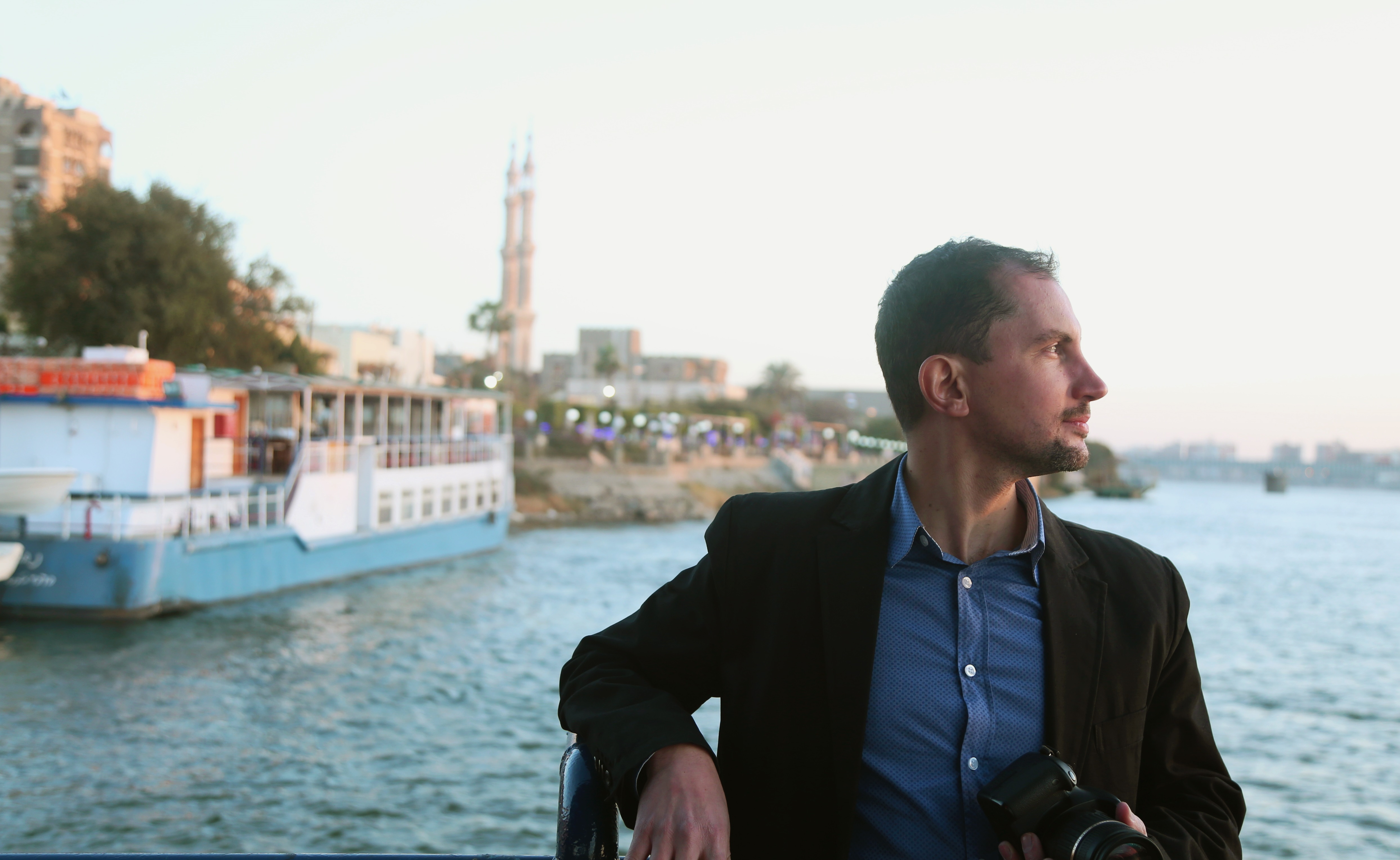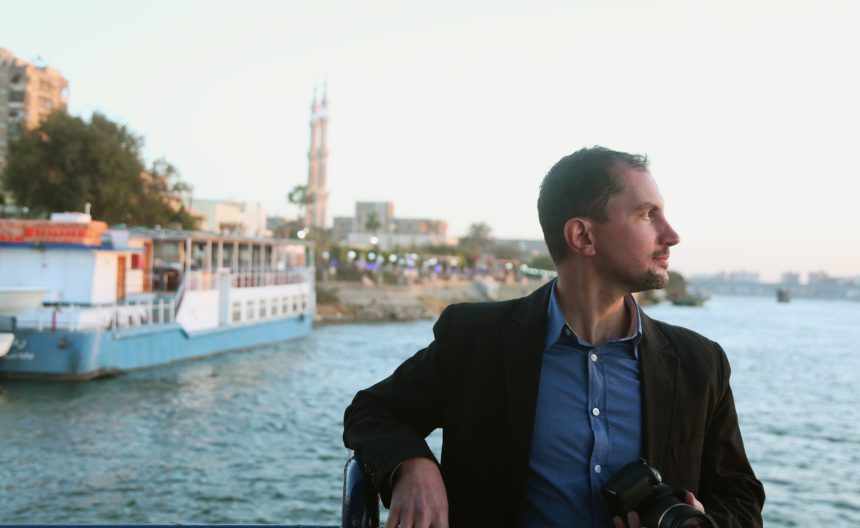Born to Palestinian parents, Mohamed Al Borno is one of 10 million “invisible” people who don’t have citizenship worldwide. So he is setting out to use filmmaking, blockchain, and disruptive ideas to challenge the traditional notion of a nation-state by creating a radically new country.
Mar 02,2017

What’s in an ID card? A number? A testament to one’s existence? Or a sense of belonging to a nation and a land? For Mohamed Al Borno, the answer to these question lies far beyond existential considerations. “I was born and raised in Egypt, but I am stateless,” he says. “My parents were Palestinian refugees, and if you are born in Egypt to non-Egyptian parents, you don’t get to become Egyptian. My parents were one of those refugees who are not allowed to live in Palestine, so I can’t live in one place more than five years, I have to renew my visa every time,” he says as he sits on the bank of the Nile in Sohag, where he travelled to head a keynote speech for Techne Drifts, to inspire Egyptian youth to shape their own future.
Indeed, his story is nothing short of extraordinary. The filmmaker and entrepreneur, now based in Canada, set out to re-imagine a different notion of state, inspired by his own experience and frustrations being a citizen of no land. “Being stateless made life more confusing,” he explains. “It makes you feel like a guest; you don’t feel like you are in your home, and if you are a guest, you don’t want to upset your host.”
This borrowed sense of belonging not only shaped – and conflicted – his interpersonal relationships, but also his interaction with history as it unfolded. “When the Egyptian revolution happened in January 2011, I felt like I missed a part of history, because I felt like an Egyptian but I didn’t have the backing of a country behind me to legitimately protest in the streets,” says the 37-year-old man. “It also affected my personal relationships; for example, in terms of dating, I didn’t want to get into a long-term relationship or marry in Egypt because I didn’t consider myself settled, as I need to renew my status and my visa every five years,” he explains.

Labelled ‘a blemish in international law’, statelessness is the result of an arbitrary system that not only leaves a myriad of loopholes but has also shaped a hierarchy of nations that considers some passports powerful and others practically useless. Around the world, there is a stateless child born every ten minutes in just five countries, which account for more than half of the world’s known stateless population, according to UNHCR.
Often called ‘invisible children’, these individuals are “denied a legal identity when they are born, as well as access to education, healthcare, marriage, job opportunities, and even the dignity of an official burial and a death certificate when they die,” according to a report titled ‘Ending Statelessness Within 10 Years’ by the organisation.
The issue becomes even more pressing in the Arab world, as the Syrian refugee crisis adds to already existing regional challenges such as not registering children born out of wedlock, or to parents whose religious marriages have not been formally registered. In over five years, since Syria’s civil war started, more than 50,000 children have been born to Syrian refugee parents in Jordan, Iraq, Lebanon, Turkey, and Egypt, the UN reports. Most are entitled to Syrian citizenship, but those who remain without civil birth registration may face serious problems later in life. In Lebanon, UNHCR found that 78 percent of new births from Syrian refugees, since their arrival to the country, were not registered with the national authorities.
What if nationality didn’t shape people’s opportunities? What if individuals could choose their belonging to a nation-state? The question drove Mohamed Al Borno to re-imagine a different system, inspired by man-made countries, virtual nationality forms, and blockchain, a new technology allowing people to establish contractual relationships without a state or entity acting as an intermediary.

“The idea came up as I tried to apply for a master’s degree to study abroad – because this was my only way out of Egypt. So, I came up with this concept of a stateless man who wants to create a new country because he can’t go back to his own land. I made a script and the Vancouver film school accepted my application,” he says, recalling the inception of an idea that grew to become a documentary and a movement.
“As I travelled through the USA and Canada, people encouraged me to turn it into a real-life documentary,” he says. “So, I’m basically following my journey as someone without citizenship trying to find a solution for the rest of us; the 10 million stateless people around the world who don’t have citizenship.”
“I am following the likes of Al Gore and Steve Wozniak – the co-creator of the apple computer, people who are trying to create countries on man-made islands in international waters which act like a self-sustaining community, micro nations, unclaimed territories, and online nations. I am trying to find an answer, and at the same time question who created this system and how can we change it. The idea of borders as we see it today is not really old, but it defines the life of more than 10 million people around the world. The question is how can we change something like this? How can we change an idea people perceive as if it existed forever? That’s what the film is about.”
In 2015, he led a crowdfunding campaign that managed to raise $25,000 in order to conduct interviews around the world, following movements such as the Seasteading Institute, sustainable floating islands, online countries such as Bitnation, and native communities in the USA thriving to create the Republic of Lakotah.
“We will show you people creating new countries, people already living the new country way of living, people living on the land, and off-the-grid, in RVs, on earth ships, boats, cruise ships. People living the true sharing economy,” he says in the crowdfunding campaign.
His idea, though seemingly idealistic, is not so far-fetched. In 2015, Czech politician and activist Vít Jedlička found an opportunity in a European border dispute to create Liberland – a tiny 7 square-kilometre parcel of land, bigger only than the Vatican and Monaco, and located between Serbia and Croatia – whose territory is claimed by neither side. Indeed, a no-man’s land. Born to the motto “to live and let live,” Liberland prides itself on the personal and economic freedom of its people – who can apply to be citizens, a freedom which is guaranteed by its own Constitution.
E-residency is already a reality in Estonia, the first country to effectively offer a transnational digital identity, which is available to anyone in the world interested in opening a business online. Although it was set up to boost the country’s entrepreneurial potential, the effects of e-Residency go far beyond business, as this e-Residency offers a government-issued smart ID card which allows identification, authentication to secure services, and digital verification of document authenticity.
“The borders on our maps create borders in our minds,” Al Borno says in his campaign. “When you become a citizen of The New Country, you break political and mental borders. This isn’t just a documentary, it’s a movement. It’s the first international country. Anyone can become a citizen. Anyone can express themselves.”
One of the most interesting spin-offs of the project, Al Borno now contemplates innovation through Blockchain technology to enable online citizenship. Designed for digital assets, blockchain is a trust-based technology that enables peer to peer trust, and has been growing in influence with the rise of Bitcoin, the digital currency that has blockchain technology at its heart.
In the Arab world, more and more industries are starting to envision blockchain-based solutions, with Dubai aiming to become the first blockchain-powered city by 2020, and accelerators such as 1776 launching the first startup competition for entrepreneurs to seek cross-industry applications of the game changing technology. “Because of this technology, I could have a reputation and I can take my reputation with me, so I can get access to physical stuff on the ground,” says al Borno. “The way I am seeking now is as an online country with offline influence, so people can partner and trade, and do stuff with each other at the same time.”
“I am worried of saying this because existing governments and countries may think ‘what are you trying to do’ but I am not going to take someone’s land; I’m not going to break the rules,” he emphasizes. “This new country has to exist without taking someone’s right; it has to exist within our humanity.”
Production by @MO4Network’s #MO4Productions.
Photography and videography: Yousef Adel Emad.
This article was originally published on Cairoscene.



Leave a Reply